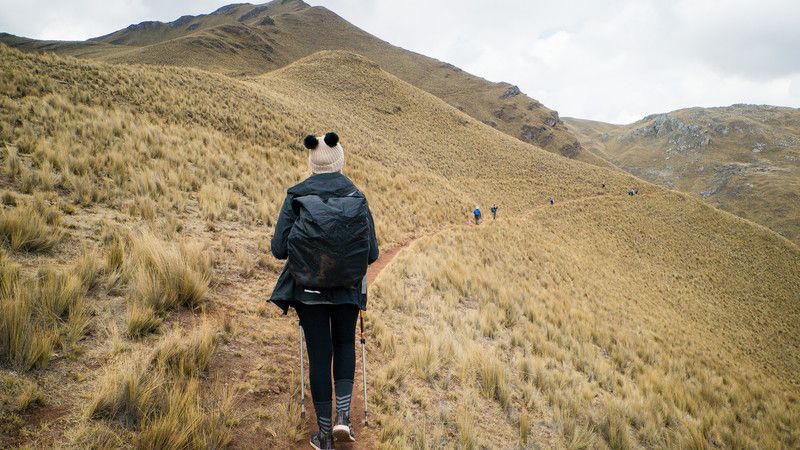We love travelling and we love phrases, so think about our shock once we got here throughout a large treasure trove of journey phrases that describe how we really feel earlier than, throughout and after we journey higher than something we’ve ever seen, ever. Within the historical past of all the things.
These literary gems make ‘wanderlust’ seem like an overrated present pony. Which it’s. Journey brochures of the long run will likely be plagued by the likes of resfeber, eudaimonia and fernweh. At the least, they’ll if we’ve something to do with it.
TAKE IT AWAY, WORDS!
1. Trouvaille (n.)
Origin: French
One thing pretty found by likelihood, like stumbling on a waterfall in Costa Rica.
2. Dérive (n.)
Origin: Latin/French
Lit. “drift”; a spontaneous journey the place the traveller leaves their life behind for a time to let the spirit of the panorama and structure appeal to and transfer them.


Dériving alongside the Quarry Path. Picture by Stephen Parry.
DÉRIVE YOUR WAY AROUND SOUTH AMERICA ON A SMALL GROUP ADVENTURE NOW
3. Numinous (adj.)
Origin: Latin
Describing an expertise that makes you fearful but fascinated, awed but attracted; the highly effective, private feeling of being overwhelmed and impressed. For instance, you could have a numinous expertise at Yosemite Nationwide Park, gazing up in surprise at El Capitan, or at a towering black bear.
4. Cockaigne (n.)
Origin: French, medieval trope
An imaginary land of luxurious and idleness. Suppose Home Tyrell of Highgarden, minus the poisoning.
5. Schwellenangst (n.)
Origin: German
Concern of embarking on one thing new; worry of crossing a threshold. However you realize what? It is best to completely simply go along with it, and cross that threshold.


Getting all Strikhedonia in Jordan. Picture by tegan & nathan.
6. Strikhedonia (n.)
Origin: Greek
The pleasure of having the ability to say “to hell with it”. Strive it now. Head to our North America web page and shriek ‘Strikhedonia’ instantly earlier than reserving a visit.
7. Resfeber (n.)
Origin: Swedish
The stressed race of the traveller’s coronary heart earlier than the journey begins when nervousness and anticipation are tangled collectively; a ‘journey fever’ that may manifest as an sickness. The one remedy is one other grand journey.
8. Vagary (n.)
Origin: Latin
An unpredictable occasion, a wandering journey; a whimsical, wild or uncommon thought, need, or motion.
ESCAPE THE VAGARIES OF LIFE ON, SAY, A SMALL GROUP ADVENTURE IN AFRICA


Embracing eudaimonia in Japan. Picture by Stephen Parry.
9. Eudaimonia (n.)
Origin: Greek
Lit. “human flourishing”; a contented state of being completely satisfied, wholesome and affluent. For instance, you might be just about assured to expertise eudaimonia as you watch the solar rise above the ocean in Playa del Carmen.
10. Quaquaversal (adj.)
Origin: Latin
Transferring or occurring in each path instantaneously. It’s a bit of like if you suppose your passport’s in your sock drawer but it surely’s not and your flight’s leaving in three hours.
11. Novaturient (adj.)
Origin: Latin
Wanting or in search of highly effective change in a single’s life, behaviour, or scenario.


Fortunately quaquaversal in Guatemala. Picture by Nathan Landers.
12. Sehnsucht (n.)
Origin: German
“The inconsolable longing within the human coronary heart for we all know now what”; a craving for a far, acquainted, non-earthly land one can determine as one’s dwelling.
13. Ecophobia (n.)
Origin: English
A worry or dislike of 1’s dwelling.
14. Eleutheromania (n.)
Origin: Greek
An intense and irresistible need for freedom. Just about describes each image of the Greek Islands we’ve ever seen.


Livsnjutare in Italy. Picture by The Frequent Wanderer
15. Livsnjutare (n.)
Origin: Swedish
One who loves life deeply and lives it to the acute.
16. Solivagant (adj.)
Origin: Latin
Wandering alone. Though we predict it’s higher if you’re solivagant with a small group of different solivagant sorts.
17. Saudade (n.)
Origin: Portuguese
A nostalgic longing to be close to once more to one thing or somebody that’s distant or that has been beloved after which misplaced; “the love that continues to be”. For instance, I’ve a nostalgic eager for Turkish Delight proper now.


Having eunoia in Vietnam. Picture by Damien Raggatt.
18. Eunoia (n.)
Origin: Greek
Lovely considering; a superb thoughts. My love of Turkish Delight proves I’ve eunoia (or does it?).
19. Sturmfrei (adj.)
Origin: Germany
Lit. “stormfree”; the liberty of not being watched by a dad or mum or superior; being alone at a spot and being able to do what you need. Like consuming 18 waffles in a day in Belgium.
20. Yoko meshi (n.)
Origin: Japan
The peculiar stress of talking a overseas language (actually means ‘a meal eaten sideways’). For those who’ve ever tried to order ramen in one in all Tokyo’s laneway bars, you’ll know precisely what this implies.


Selcouth outfits within the Sacred Valley. Picture by Stephen Parry.
21. Selcouth (adj.)
Origin: English
Unfamiliar, uncommon, unusual, and but marvellous, like including cheese to your espresso in Colombia.
22. Fernweh (n.)
Origin: German
An ache for distance locations; the longing for journey; the alternative of homesickness. Additionally one in all Instagram’s hottest hashtags.
23. Yūgen (n.)
Origin: Japan
An consciousness of the universe that triggers emotional responses too deep and mysterious for phrases.


It’s arduous to not really feel yūgen in a spot like this. Picture by Damien Raggatt.
24. Commuovere (v.)
Origin: Italy
Solely in Italy would you discover such a sensual phrase which means to stir, to the touch, to maneuver to tears. Presumably whereas consuming a large slice of thin-crust pizza.
SUBSCRIBE TO INTREPID’S NEWSLETTER FOR TRAVEL TIPS, COMPETITIONS, GIVEAWAYS & MORE
25. Peregrinate (v.)
Origin: Latin
To wander from place to put. AKA journey. It’s the very definition. Consider a falcon and BE THE FALCON by embracing its love of flying instantly.
26. Nemophilist (n.)
Origin: English
One who’s keen on forests; a haunter of the woods. Not like a spooky ghost; extra like a man with a top-knot who enjoys spending his weekends writing poetry beneath an outdated oak tree and ingesting black espresso from a classic thermos.


Peripatetic over a rock. photograph by Phoebe Escott-Kenny.
27. Peripatetic (n.)
Origin: Greek
An individual who spends his or her time wandering. There’s nothing pathetic about being peripatetic – we embrace the wanderers wholeheartedly.
GET PERIPATETIC IN THE MIDDLE EAST. EXPLORE OUR RANGE OF ADVENTURES NOW
28. Hireath (n.)
Origin: Welsh
A homesickness for a house you can’t return to, a house that maybe by no means was. Which is sort of a downer, however a superb excuse to maintain travelling.
29. Gadabout (n.)
Origin: English
An individual who travels usually, and for pleasure. One thing we must always all aspire to, proper? Be skilled gadabouters? Replace your LinkedIn profiles now, gang.
Now you’ve bought the lingo, USE IT! Impress your pals together with your newfound vocabulary on a small group journey with Intrepid.
